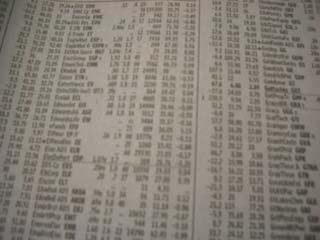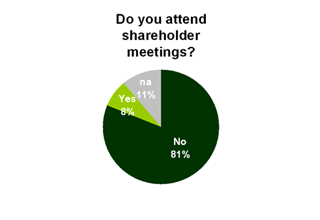management
 |
In July 2004, we set out to gauge whether or not the small retail investor was indeed preparing for an unprecedented leap into the boardroom with proxy-withholds and other bold collaborative voting maneuvers of recent months.
We polled 100 random consumers in investing-related real-time communities online and 92 said they owned stocks. But because over 83% of those were directly involved in the purchasing of their own stocks (as opposed to work-related plans or financial planners), we realized that our survey primarily reached active traders (defined as shareholders interested in profiting from short-term fluctuations of the price of securities who typically hold their shares for the very short term).
It's logical to assume that the movement of large blocks of money can affect the stability and value of a stock, which is the thinking behind why most public firms seek to get institutional investors to purchase their shares (institutional investors are defined as shareholders interested in profiting from the dividends a public company pays its shareholders as well as the difference between the value of the shares when they purchased and sell them). However, what if the reverse is true, that the trading activity of large numbers of traders (in this case) can indeed increase the value of the stock in the long-term, if it's consistently heavily traded?
 |
We believe this can occur. Our data revealed that traders are disinterested in attending shareholder meetings or getting involved with management decisions because they don't have time (11%), don't own enough stock (including voting stock - 10%), have no interest in traveling (7%), or simply don't care (40%). It's reasonable to say that they may not even be interested in purchasing stock with voting rights (outside of their desire to trade for profit.)
Because they're not motivated by the long-term performance of a public company, they couldn't care less what the company does. Hence, contrary to popular belief, they also don't seek nor analyze too much information outside of the basic, easy-to-get-at public information that causes the rest of the market to react, too (i.e. weather, sales, and basic supply and demand). So why not develop a non-voting stock catering to traders?
Although the possibility exists that other investors or traders themselves may feel alienated by this new class of stock, it's reasonable to speculate that when enough traders trade it, the price of this new class of stock would fluctuate so wildly, it will naturally attract traders, while simultaneously scare off investors, relegating their investments to traditional classes of stock. The more traders actively trade this new stock, two things may occur: the stock will increase in value over time; or the stock will remain relatively stable, both across long-term horizons. Price decreases are, of course, expected, but always preceding larger price increases. (At this point, this is all speculative and doesn't take into account wild short-term fluctuations).
This stock would not pay dividends, permitting low-to-modest dividend payments from other classes of stock that don't ordinarily pay dividends, continuing its separate attraction of long-term investors, simultaneously firming up share price. This would consequently make share-repurchase strategies unnecessary, freeing up billions in cash to invest in other areas.
If traders have their own
playground, public companies wouldn't need to spend millions trying to understand
how they behave to temper their impact on the price of a stock. With two types
of stocks for two shareholders - traders and investors - management can truly
manage for shareholder value.
Write to Al Berrios at editor@alberrios.com
Disclaimer:
The recommendations, commentary and opinions published herein are based on
public information sometimes referenced via hyperlinks. Any similarities or
likeness to any ideas or commentary from any other sources not referenced
is purely coincidental. al berrios & co. cannot control any results occurring
from advice obtained from this publication nor any opinion(s) conveyed by
any reader of this publication.
(c) 2004. All Rights Reserved. al berrios & company, inc. Published
by al berrios & co. This Report may not be reproduced or redistributed
in any form without written permission from al berrios & co., subject
to penalty.